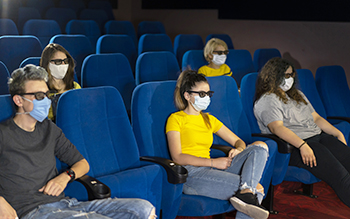Infectious disease expert offers tips to stay safer at the movies
(SACRAMENTO) —
Here is some pleasant news amid the warnings and cautions about life during the COVID-19 pandemic: Going to a movie may be less risky than you think.
 If theaters space out patrons, and people keep their masks on, a trip to the movies may not be particularly risky.
If theaters space out patrons, and people keep their masks on, a trip to the movies may not be particularly risky.“It sounds like trouble – many people confined indoors, in one room, for a prolonged period,” said Natascha Tuznik, a UC Davis Health associate professor of infectious disease. “But now that masks are required – and if the theater does everything right – a theater should pose less risk of person-to-person transmission than many other places people are going now.”
Before you rush to the theater, Tuznik still urges caution.
“Remember, ‘less risk’ doesn’t mean ‘no risk,’” she said. “But it is less risky than places like gyms, where people are breathing heavily and sweating, or bars where people can get too close or talk loudly and expel more of the virus, even with masking requirements.”
Sitting in a theater should be safer, she said, because:
- People are not talking to each other during a movie – we hope.
- Six-foot social distancing can be practiced if the theater limits guests, blocks off every other seat, and spaces people in a checkerboard configuration so no one is breathing directly at someone else.
- People are facing the same direction, which is known to reduce transmission risks.
Tuznik has more advice to help reduce your risk at the movies. It starts with learning the policies of the theater. Are they limiting capacity to a maximum of 50%? Are they staggering show times to allow more time to clean between screenings and to reduce the size of the crowds in the lobbies?
“But you may have to go there to find out,” she said. “Calling a movie theater and getting a real person is not the easiest thing.”
She also suggests we:
- Avoid eating and drinking during the movie, which would require frequent mask removal. “I know popcorn is part of the fun of going to the movies, but it adds to your risk,” she said.
- Don’t sit near others who are eating or drinking.
- Especially avoid self-serve concession stands.
- Bring your own wipes or cleaner to wipe down the armrests – hand sanitizer on a paper towel is one way to do it.
- If possible, don’t use the restrooms. If you must, don’t go in if they are crowded.
There are a few added protections that some theater companies are considering, including plastic barriers between seats and disposable seat covers.
“It’s definitely worth checking on those, if you can,” Tuznik said. “Like everything else right now, going to the movies will be harder, especially if you’re cautious. But the extra effort is worth it.”
California’s requirement that people wear masks in all indoor public places decreases the risk, but it’s unclear how, or if, this will be enforced inside the theater during the showing.
“I know this isn’t fun,” Tuznik said, “but just like at so many other places right now, be prepared to leave. Missing the end of a movie is bad. Getting sick is worse.”
She had one other tip. Consider a drive-in theater. “Bring your own soda and popcorn and relax,” she said. “You also don’t have to worry about another patron taking phone calls.”
https://health.ucdavis.edu/health-ne...expert/2020/06
My question is.... How many plex's are you familiar with that recirculate air? Most I have been involved with do to cut hvac costs down.
Also, has anyone you know of installed UV light treatment in their air handlers? I know of just one location in Maryland that did. I would think the latter would be a great thing to advertise to make customers feel safe enough to come to your theater.
Comment